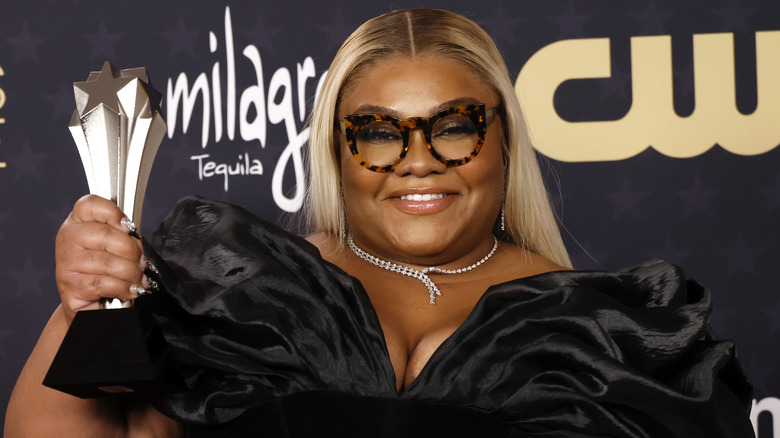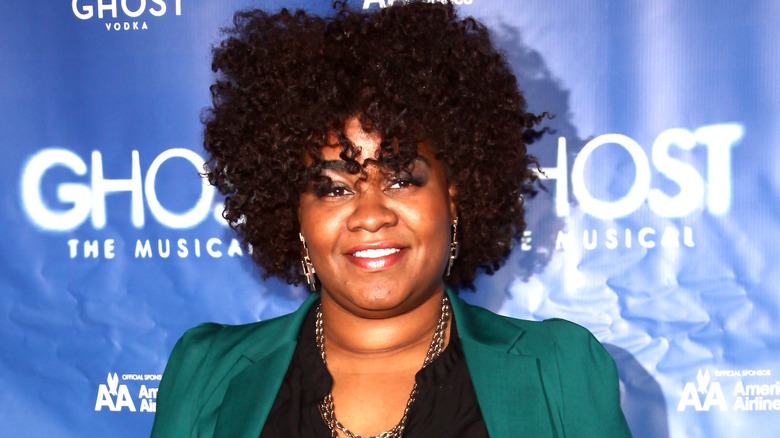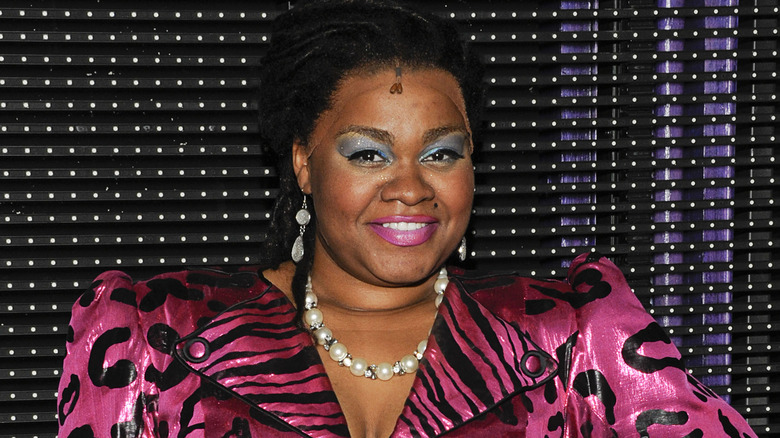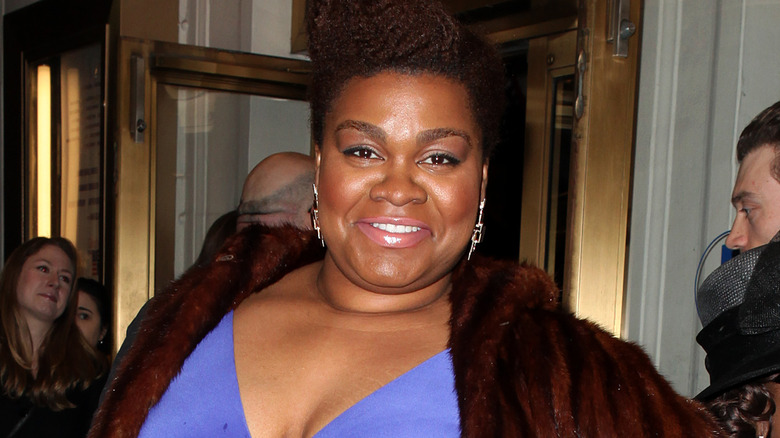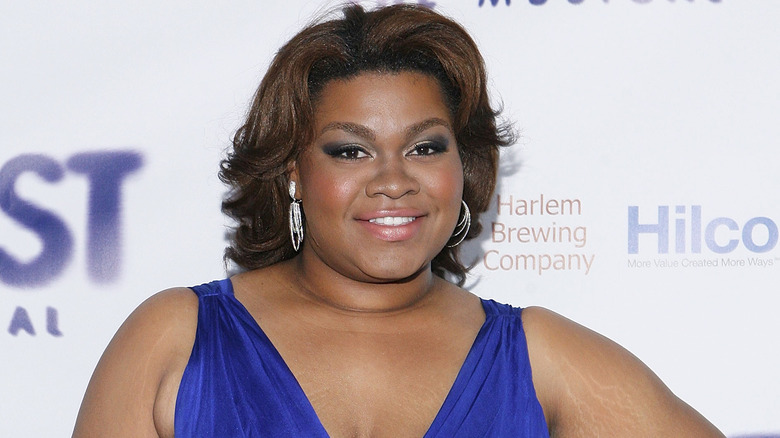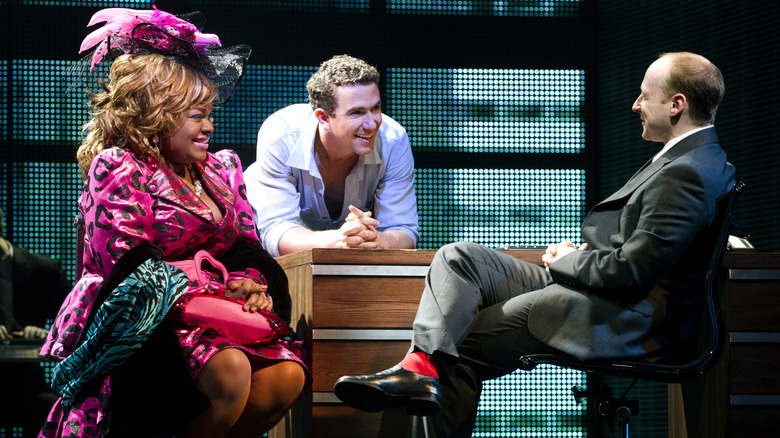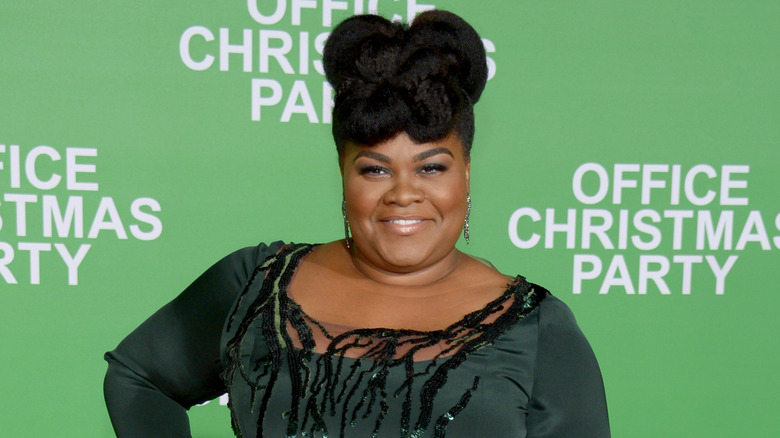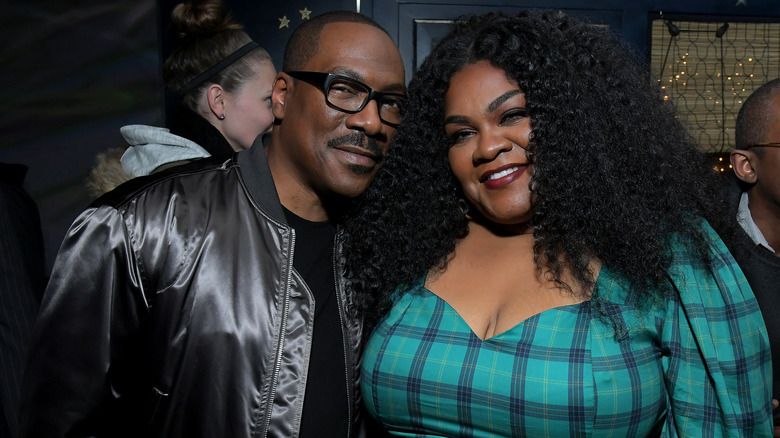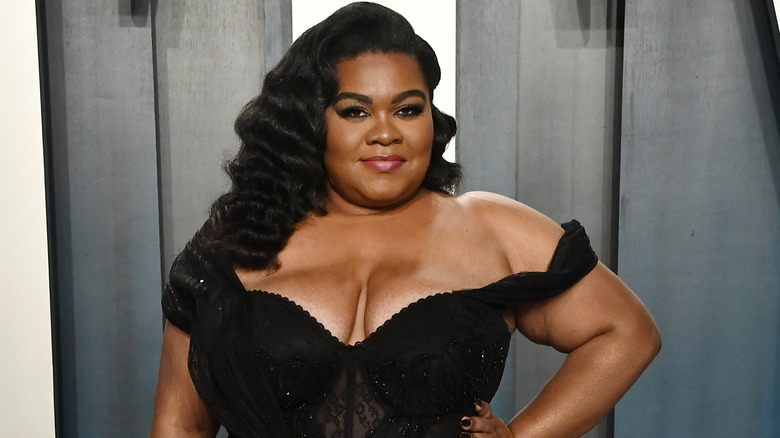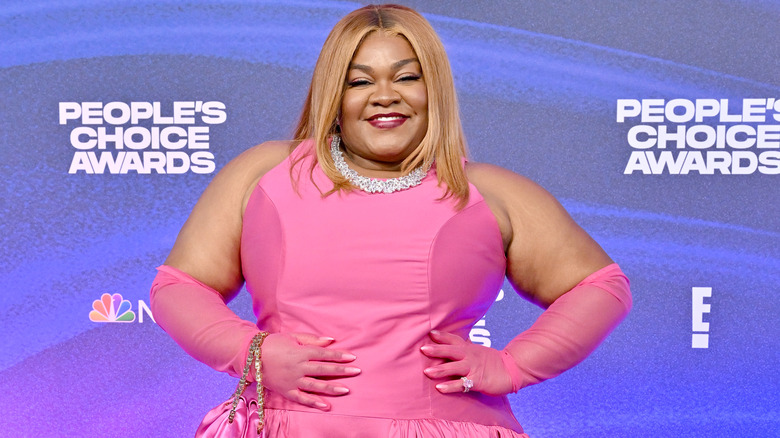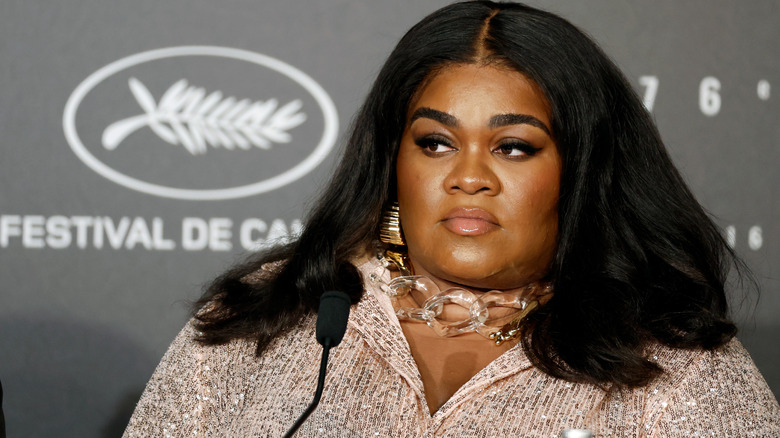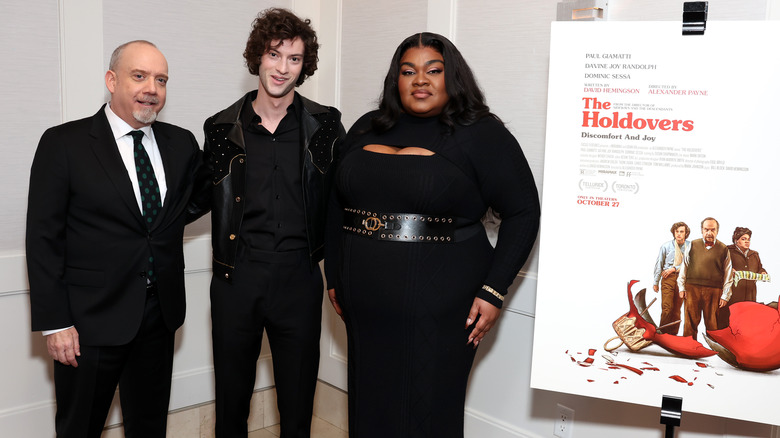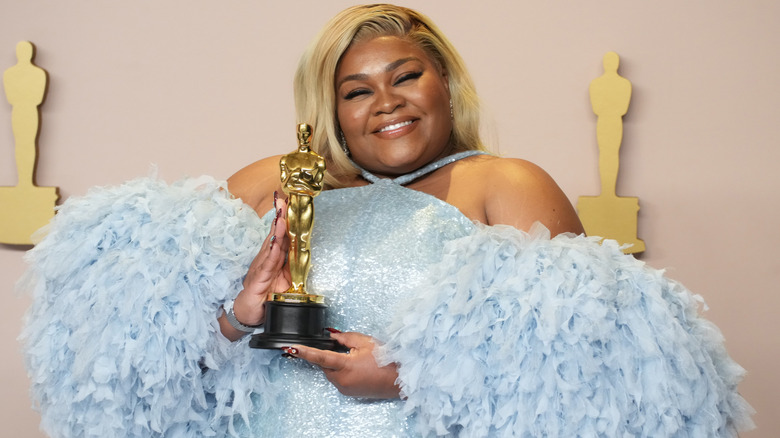The Stunning Transformation Of Da'Vine Joy Randolph
The 2024 Academy Awards were full of surprises. From Ryan Gosling bringing resounding Kenergy (and his sister) to the Oscars to the contentious moment Emma Stone won best actress over Lily Gladstone, who would have made history as the first Indigenous American to win the prize, social media has been abuzz over the ceremony. Amid the controversies, the snubs, and of course, all the worst-dressed stars at the Oscars, was the glowing, effortlessly chic Da'Vine Joy Randolph.
The star, who won best supporting actress for her role as a grieving mother in "The Holdovers," wowed the red carpet in her stunning blue ensemble and sobbed as she took the stage to receive her due after years in the trenches as a working actor. "For so long, I've always wanted to be different," she said in her acceptance speech (via SHOWSHA), "and now I realize I just need to be myself." In a particularly touching moment, she was joined in tearful joy by her co-star, Paul Giamatti.
But the accomplished actor had been killing it onstage and on-screen long before she took home the gold statuette, and it's finally her time to shine. Following her Oscar win, "Da'Vine Joy Randolph" is a name audiences both at home and abroad will hear much more in the coming years. As she gracefully accepts her induction into A-list Hollywood stardom, let's take a look at how she came to be the formidable actor she is today: Here's the stunning transformation of Da'Vine Joy Randolph.
Da'Vine Joy Randolph's birth was greeted with unbridled happiness
Da'Vine Joy Randolph's birth came as a surprise — and a welcome one at that. Her parents had been trying to conceive for years with no luck until one day an unexpected arrival came their way. "My parents told me it took them seven years to have me and that I was a divine joy. So, Da'Vine Joy!" Randolph told Philadelphia magazine. The Philly native was raised in Mount Airy, a neighborhood famed for its cultural and historical significance (Mount Airy was one of the few places in the U.S. to actively welcome integration between Black and white families in the 1950s).
A '90s kid, Randolph has reflected on her childhood in Mount Airy with idyllic nostalgia. "There was this ice-cream truck that went around," she recalled. "The lady on it was Miss Joyce. She used to have really good water ice and cheese pretzels. But here's the thing: She would come around at 5 o'clock. Before dinner! It was a parent's worst nightmare. ... So yeah, loved that truck." Encouraged by her father, she also spent much of her childhood frequenting museums.
As she explained to W Magazine, her priority as a child was to help others in some way, and she hoped to one day secure a job that would enable her to do so. Despite her palpable avidity for arts and culture, it never crossed her mind that she would enable others through becoming an actor.
Growing up, Da'Vine Joy Randolph was the only natural performer in her family
As a child, Da'Vine Joy Randolph felt like an outsider. In an interview with Harper's Bazaar, she described herself as a quirky kid who was always on the move. From a young age, she exhibited an aptitude for performing arts, which was an anomaly in her family. "No one in my family had the, like, performance gene," she explained. "My mom was always like, 'Sing that thing you learned this week!' Or, 'Show them that dance!' So I was always performing for family and friends." She went on to divulge that she was so invested in these childhood performances that she would frequently get into costume and put on makeup for them, something her parents found endearing.
Randolph's community in Philadelphia also supported her, with neighbors and teachers uplifting the creative youngster. Although both her parents and her community nurtured her artistic traits, she couldn't help but feel like she didn't quite fit in as a Black girl with showbiz dreams. "I knew I was always different," she told The Hollywood Reporter, "and so therefore I thought maybe I needed to conform to something else because when I looked at [the Oscars] for many years as I was growing up, I didn't necessarily see myself there." Subsequently, she attempted to change herself in the pursuit of success, until one day she realized that being her authentic self was all she needed to achieve that success.
Da'Vine Joy Randolph trained as an opera singer before venturing into acting
Da'Vine Joy Randolph's creative ambitions first manifested through singing. She attended a performing arts summer camp and trained there as an opera singer. Her talents were also nurtured by a mesmerizing singer she met at a church Christmas concert. "I didn't really want to do opera, but she saw something in me," Randolph told The Guardian. "She was like: 'You have a natural gift for this.' Then she was telling me opera singers get to travel the world and be loved ... I was like, sign me up, that's the job for me."
Subsequently, the classically trained opera singer attended Temple University to study classical musical arts. However, she embraced the musical theater crowd and swiftly switched majors her junior year. Then, in 2011, she received a master's in fine arts from Yale. "I've grown confident due to having [certain] teachers instilling in me that I have a gift. ... [I went to Yale because] I always wanted to have the tools to be able to play any role at all," she told Who What Wear.
Since then, Randolph hasn't given much thought to adding a discography to her eclectic and impressive resume (though she did show off her pipes on "High Fidelity"). "I'd like to do more singing," she told Philadelphia magazine, "but acting takes up so much of my time." However, she has expressed a desire to play opera singer Leontyne Price in a biopic.
The star endured tragedy — then channeled it through her work
From a young age, Da'Vine Joy Randolph faced prejudice. As the only Black girl attending an all-white private school, she had to contend with bigots laughing at her when she divulged her career aspirations. "I said that I would want to play Juliet in 'Romeo and Juliet,'" she recalled to NPR in 2019, "had the tools to play her no matter what my size is or what I look like or the color of my skin ... All the schools laughed ... And Yale was the only school that was like, absolutely." She went on to address that bigotry through acting, intent on dispelling racist stereotypes through her roles.
Years later, she would go on to experience greater tragedy, with which she imbued her performance in "The Holdovers." As she explained to NPR in a 2024 interview, her cousin died suddenly, and just six months later, her aunt (her cousin's mom) was diagnosed with terminal cancer. "[S]he was slowly dying of a broken heart," she revealed. "And no one said anything ... I remember then understanding the force that grief can be."
Speaking to CBS News, Randolph argued that Black women had a superpower when it came to surviving and thriving in the face of adversity. "[I]f they don't want you to know, you won't know at all," she said. "They operate at a higher level of efficiency in order to cover it up of what they're actually going through.
She got her big break in Ghost: The Musical
After graduating from college, Da'Vine Joy Randolph moved to New York. As she told Harper's Bazaar, she always felt like a New Yorker at heart and moved to Harlem. There, she began auditioning for a number of theater roles. By November 2011, she scored the part of psychic Oda Mae Brown — a role made famous by Whoopi Goldberg some 20 years earlier — in "Ghost: The Musical" on Broadway. Starring on Broadway was Randolph's dream, so she was understandably thrilled.
However, before making her Broadway debut, she received a call informing her that Sharon D. Clarke, who portrayed Oda on London's West End, had been injured and was unable to perform. "I then flew into London on Sunday," she explained to HuffPost, "and they gave me the script at the airport, went into rehearsal on Monday and then the director said, 'You're going to go on Friday night.' But miraculously, when you're on your grind, it's amazing what you're capable of doing."
By the spring of 2012, her Broadway dreams had materialized. "It is surreal," the then 25-year-old told PennLive. "So much has happened. ... One moment you can be a starving actor out in the streets of New York and just like that, life can completely change." She was praised highly for her performance, with the Taunton Daily Gazette singling Randolph out as the breakout star of the show. The role also earned her a Tony nomination for best featured actress.
When she was in a slump, Da'Vine Joy Randolph received some life affirming wisdom from Al Pacino
Despite all the acclaim she received following her performance in "Ghost: The Musical," Da'Vine Joy Randolph found herself feeling isolated and burned out. As she revealed in an emotional Instagram post shared in 2019, she lost her voice during her Broadway run and feared that she would never regain it.
One day, she went to a little New York cafe where she encountered none other than Al Pacino, who took it upon himself to offer her some sagacious advice. After hearing about Randolph's anxieties and fears regarding her career, Pacino explained that acting was like a ladder, and as stars ascend the ladder, they lose people along the way. "I see you, and you are exactly where you need to be. Keep climbing the ladder," Pacino concluded. Feeling validated and reassured, Randolph went on to perform her second show that day. "Cataloging that moment into my soul for eternity," she wrote.
The musical's run abruptly came to an end in the summer of 2012. She then went on to appear in a number of film and TV roles in the early and mid-2010s, such as the short-lived sitcom "Selfie," a guest stint on "This Is Us," and a supporting role in the movie "Office Christmas Party." The best, however, was yet to come.
Da'Vine Joy Randolph was praised for her role in Dolemite Is My Name
Based on the life of eccentric actor Rudy Ray Moore, who created the titular character, 2019 film "Dolemite Is My Name" marked Eddie Murphy's comeback after a six-year break from acting. Randolph was thrilled when she secured the part of Lady Reed, who performs crude stand-up with Murphy's Rudy before the pair hatch a cinematic plan. The role was a dream come true for Randolph.
In an interview with The New York Times, she credited the film with changing the trajectory of her career — but it almost didn't come to fruition. "Interestingly enough, I had booked it — deal signed and everything — and then they were like, uh, we don't know," she explained. "They made me re-audition, which was intense. But the gift in it was, if that didn't happen, I wouldn't have felt as confident and forthright." Moreover, she learned more about her craft through working alongside Murphy. As she explained to The Guardian, Murphy taught her how to pace herself, conserving energy when she's not on-screen in order to give her performances her all.
For her formidable portrayal of Lady Reed, Randolph received a standing ovation at the film's world premiere. As she told Who What Wear, the film opened innumerable doors for her. "To keep it up every day and take it up again in the face of constant rejection, it takes extreme laser focus in order to do something like that," she reflected.
The actor's filmography speaks to her staunch selectiveness when it comes to roles
Da'Vine Joy Randolph only gained widespread fame and acclaim when she reached her late 30s. This was partly due to her refusal to take on just any gig that came her way. In 2020, she was cast as Cherise in the 2020 TV adaptation of "High Fidelity." Although Randolph relished working alongside Zoe Kravitz, she noticed that there was a lack of authentic representation of Black women in the series.
Accordingly, she argued that this was partly responsible for the show not being renewed for a second season (she did, however, note that the creators were intent on rectifying this). "I started noticing within the industry, a woman of size — and especially a woman of color of size — can be pigeonholed into a certain lane," she told Elle. It was a turning point for Randolph, who became more cognizant than ever of Hollywood's piecemeal approach to diversity. But she has consistently refused to settle for less.
The following year, Steve Martin cast her in "Only Murders in the Building." Randolph, who portrayed Detective Dee Williams across three seasons, was overjoyed by the opportunity to work with comedic legends Martin and Martin Short. "It's such a wonderful working environment," she enthused to The New York Times. "And just to be around Steve Martin and Martin Short — they still have this childlike anticipation and excitement, like it was their first project. That blows me away, every single time."
Da'Vine Joy Randolph has a passion for fashion
For Da'Vine Joy Randolph, fashion has always been fundamental, a means of showcasing her uniqueness. Accordingly, she has rejected the notion that all curvy women ought to wear the same clothing from size-inclusive stores. "I was at a premiere for something and a curvy reporter had on the same outfit as me," she told Elle in 2022. "It's not like, 'She shouldn't have had that on.' But it didn't make me feel like I did my job."
Subsequently, she decided to wear custom clothing to events. As she told Vogue, she models her look on old-school movie stars, taking inspiration from the likes of Audrey Hepburn and Shirley MacLaine (she's particularly obsessed with MacLaine's camp, pink-tastic classic "What a Way to Go!"). Since then, Randolph has been routinely praised for her red carpet looks.
The actor's keen sartorial eye also manifests in her work. She told Elle that the right garb was central to her role in the film "On the Come Up" (2022), in which she played an aunt, nicknamed Pooh, who is determined to help her niece realize her rap dreams. In contrast to the glam characters Randolph often plays, Pooh had a penchant for streetwear. She came up with the character's wardrobe after taking a drive around Los Angeles with a friend, on the hunt for Pooh's aesthetic. "[B]y the time I put on everything, I was there ... I was locked into the character," she added.
Da'Vine Joy Randolph has no time for criticism of The Idol
The Weeknd vehicle "The Idol" was steeped in drama, which included criticism of its toe-curling dialogue and accusations of misogyny. Da'Vine Joy Randolph starred in the widely panned 2023 series as Destiny, Jocelyn's (Lily-Rose Depp's character's) manager alongside Hank Azaria's Chaim. Destiny and Chaim are notable for being two of the only characters in the series who aren't driven by purely selfish intentions. In an interview with Vulture, she revealed that she was creator Sam Levinson's first choice for her role. She argued that Levinson took a bold risk with the series, contending that it delves into themes people are usually too uncomfortable to discuss.
While "The Idol" has been universally lambasted for the aforementioned reasons, Randolph has no time for negativity. As such, she refused to pay any attention to the onslaught of bad press that accompanied its premiere. "Very early on in my career, I chose to never engage in that," she told Bustle. "I know why I'm doing what I'm doing. I want to make people feel good and seen and heard."
Subsequently, she told Vulture she was proud of her work on the series and deemed it some of the most challenging of her career. "If I'm honest, I don't usually get that challenged in my work," she explained. "I've been very blessed to be consistently working and I don't take that lightly at all; it's an extreme privilege."
She paid tribute to inspirational Black women through her role in The Holdovers
In 2023, Da'Vine Joy Randolph was cast in Alexander Payne's "The Holdovers." In the film, which is set in a New England boarding school, Randolph portrays Mary, a cafeteria worker whose son was killed in the Vietnam War. From the outset, she knew that the film would be a hit, largely due to the warm rapport between the cast and crew. In particular, she developed a close bond with co-star Paul Giamatti. "We spoke the same language," she told Vanity Fair in 2023. "We just really had this amazing shorthand where it was truly as if we had been working together for years."
During filming, she created a mood board for Mary featuring women who inspired her, such as Louise "Weezy" Mills Jefferson from "The Jeffersons." "I wanted people to think of their auntie, their grandmother, their mother," she told People. "Snatching me into the period helped me really lock in with her."
As she told The Hollywood Reporter, she wanted to pay tribute to inspirational Black women — including her grandmother, whose glasses she kept with her on set — through subtle touches added to Mary's hairstyles and wardrobe. "I did a lot of research," she explained, "and did little subliminal messages, if you will, with hairdos and details and accessories beyond the glasses, giving homage to women ... it felt like a love letter back to Black women."
After years of rejection, Da'Vine Joy Randolph feels empowered by her Oscar win
In 2024, Da'Vine Joy Randolph finally attained the acclaim and recognition she had long sought, winning the Oscar for best supporting actress for her performance in "The Holdovers." "My whole career has led to this moment," she told Refinery29 prior to the ceremony, "and my prayer is that I will continue to have opportunities in which I can tell these types of stories."
In her acceptance speech (via NBC News), she opened up about her vulnerabilities as a performer, admitting that she never thought acting was supposed to be her career. Subsequently, she paid tribute to her mom — the first person who told her that she would make it as a performer — who encouraged her to study theater.
Indeed, her mother was right. Randolph currently has a number of high-profile projects in the works, including a role alongside Rebel Wilson in the action comedy "Bride Hard." And with her fame and success, she hopes to pave the way for all the other children who were once told that they could never play Juliet. "The people who've done it before me allow me to be in this position now," she told The Hollywood Reporter following the ceremony. "And so the type of work I do, my strive for authenticity, for quality, allows there to be a new standard set, where we can tell universal stories in Black and brown bodies."
